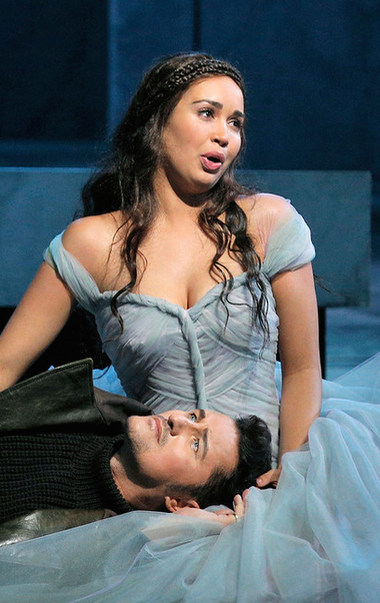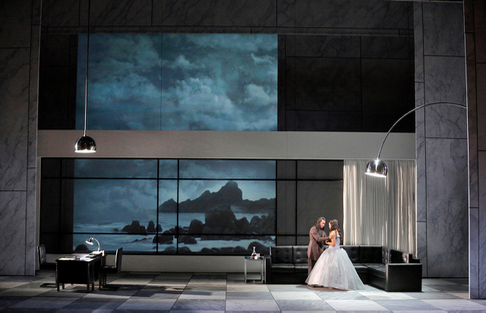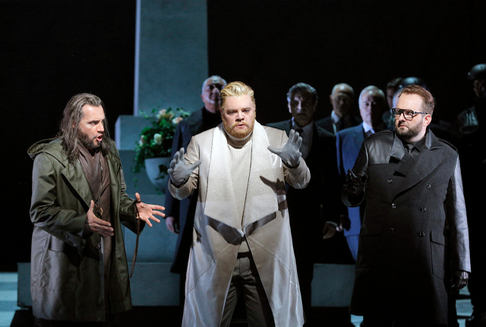
13 Oct 2015
Lucia di Lammermoor in San Francisco
First it was Bulgarian soprano Sonya Yoncheva who cancelled in Zurich (no longer in her voice), then it was . . .
English Touring Opera are delighted to announce a season of lyric monodramas to tour nationally from October to December. The season features music for solo singer and piano by Argento, Britten, Tippett and Shostakovich with a bold and inventive approach to making opera during social distancing.
This tenth of ten Live from London concerts was in fact a recorded live performance from California. It was no less enjoyable for that, and it was also uplifting to learn that this wasn’t in fact the ‘last’ LfL event that we will be able to enjoy, courtesy of VOCES8 and their fellow vocal ensembles (more below …).
Ever since Wigmore Hall announced their superb series of autumn concerts, all streamed live and available free of charge, I’d been looking forward to this song recital by Ian Bostridge and Imogen Cooper.
The Sixteen continues its exploration of Henry Purcell’s Welcome Songs for Charles II. As with Robert King’s pioneering Purcell series begun over thirty years ago for Hyperion, Harry Christophers is recording two Welcome Songs per disc.
Although Stile Antico’s programme article for their Live from London recital introduced their selection from the many treasures of the English Renaissance in the context of the theological debates and upheavals of the Tudor and Elizabethan years, their performance was more evocative of private chamber music than of public liturgy.
In February this year, Albanian soprano Ermonela Jaho made a highly lauded debut recital at Wigmore Hall - a concert which both celebrated Opera Rara’s 50th anniversary and honoured the career of the Italian soprano Rosina Storchio (1872-1945), the star of verismo who created the title roles in Leoncavallo’s La bohème and Zazà, Mascagni’s Lodoletta and Puccini’s Madama Butterfly.
Evidently, face masks don’t stifle appreciative “Bravo!”s. And, reducing audience numbers doesn’t lower the volume of such acclamations. For, the audience at Wigmore Hall gave soprano Elizabeth Llewellyn and pianist Simon Lepper a greatly deserved warm reception and hearty response following this lunchtime recital of late-Romantic song.
Collapsology. Or, perhaps we should use the French word ‘Collapsologie’ because this is a transdisciplinary idea pretty much advocated by a series of French theorists - and apparently, mostly French theorists. It in essence focuses on the imminent collapse of modern society and all its layers - a series of escalating crises on a global scale: environmental, economic, geopolitical, governmental; the list is extensive.
For this week’s Live from London vocal recital we moved from the home of VOCES8, St Anne and St Agnes in the City of London, to Kings Place, where The Sixteen - who have been associate artists at the venue for some time - presented a programme of music and words bound together by the theme of ‘reflection’.
'Such is your divine Disposation that both you excellently understand, and royally entertaine the Exercise of Musicke.’
Amongst an avalanche of new Mahler recordings appearing at the moment (Das Lied von der Erde seems to be the most favoured, with three) this 1991 Mahler Second from the 2nd Kassel MahlerFest is one of the more interesting releases.
‘And there was war in heaven: Michael and his angels fought against the dragon; and the dragon fought and his angels, And prevailed not; neither was their place found any more in heaven … that old serpent … Satan, which deceiveth the whole world: he was cast out into the earth, and his angels were cast out with him.’
If there is one myth, it seems believed by some people today, that probably needs shattering it is that post-war recordings or performances of Wagner operas were always of exceptional quality. This 1949 Hamburg Tristan und Isolde is one of those recordings - though quite who is to blame for its many problems takes quite some unearthing.
There was never any doubt that the fifth of the twelve Met Stars Live in Concert broadcasts was going to be a palpably intense and vivid event, as well as a musically stunning and theatrically enervating experience.
‘Love’ was the theme for this Live from London performance by Apollo5. Given the complexity and diversity of that human emotion, and Apollo5’s reputation for versatility and diverse repertoire, ranging from Renaissance choral music to jazz, from contemporary classical works to popular song, it was no surprise that their programme spanned 500 years and several musical styles.
The Academy of St Martin in the Fields have titled their autumn series of eight concerts - which are taking place at 5pm and 7.30pm on two Saturdays each month at their home venue in Trafalgar Square, and being filmed for streaming the following Thursday - ‘re:connect’.
The London Symphony Orchestra opened their Autumn 2020 season with a homage to Oliver Knussen, who died at the age of 66 in July 2018. The programme traced a national musical lineage through the twentieth century, from Britten to Knussen, on to Mark-Anthony Turnage, and entwining the LSO and Rattle too.
With the Live from London digital vocal festival entering the second half of the series, the festival’s host, VOCES8, returned to their home at St Annes and St Agnes in the City of London to present a sequence of ‘Choral Dances’ - vocal music inspired by dance, embracing diverse genres from the Renaissance madrigal to swing jazz.
Just a few unison string wriggles from the opening of Mozart’s overture to Le nozze di Figaro are enough to make any opera-lover perch on the edge of their seat, in excited anticipation of the drama in music to come, so there could be no other curtain-raiser for this Gala Concert at the Royal Opera House, the latest instalment from ‘their House’ to ‘our houses’.
"Before the ending of the day, creator of all things, we pray that, with your accustomed mercy, you may watch over us."

First it was Bulgarian soprano Sonya Yoncheva who cancelled in Zurich (no longer in her voice), then it was . . .
German soprano Diana Damrau who cancelled in San Francisco (too tired). Former Adler Fellow Nadine Sierra was poised to step into the bloodied costumes in both cities.
The young soprano paused a moment on the top of a glass skyscraper, then leapt to her death. All reports from the 1200 seat Opernhaus Zürich are that Mlle. Sierra’s mad scene was delightful and that she had effectively, if carefully negotiated the rest, and quite beautifully.
The world has awaited news about how this fine young (27 years) soprano would fare at San Francisco’s War Memorial Opera house, essentially three times the size of the Zurich house. The consensus is that Mlle. Sierra sang beautifully and held the stage. No small feat for an ingenue soprano, not yet a star.
That Mlle. Sierra did not take San Francisco by storm as she had Zurich (with reservations) is explained by two factors.
The first is that she was thrust into a hostile production, essentially a marble quarry when it was not the formalized architecture of Baroque opera complete with a scenic machine (the full stage show flat that was a camera shutter, astonishing because even though it was made of marble slabs it moved so smoothly and easily). But sometimes the setting was a marble knock off of Fritz Lang’s 1927 sci-fi film Metropolis. Every-once-in-a-while there were cameo’s of what were surely the crashing waves of the Pacific.
 Nicolas Testé (Raimondo), Nadine Sierra (Lucia)
Nicolas Testé (Raimondo), Nadine Sierra (Lucia)
The beautifully wrought studio bel canto of a young singer did not have a chance as Lucia di Carrara (Italy’s famous marble quarry).
The second factor is the pit. Conductor Nicola Luisotti exploited every possible effect from his orchestra, effecting a bel canto competition between the stage and the pit. And too this maestro is known for controlling his singers, thus the stage often is merely an extension of the pit. Even the stage movement is controlled by Luisotti’s domination of his singers, as an example the mad scene was staged as a straight line moving straight upstage from the conductor podium.
Experienced singers — stars — are usually able to cope with this maestro, and sometimes a synergy is effected. Great things can happen. An ingenue artist has not yet absorbed the considerable presence needed to impose himself or herself on this maestro.

Nicolas Testé (Raimondo), Brian Mulligan (Enrico) and AJ Glueckert (Normanno)
Some of the singing in this Lucia was effective, notably baritone Brian Mulligan sang Enrico’s first act aria aria and cabaletta stylishly and convincingly. Mr. Mulligan is also singing Sweeney Todd where his cardboard acting works. And we also recently saw Mr. Mulligan as Marcello in Boheme (where it didn’t), and as Cassandra’s fiancé in Les Troyens, as Count Anckarström in Ballo, and the list goes on and on. One begs the question — is Mr. Mulligan the only baritone in the world? One shoe size does not fit all feet and one fine baritone voice does not fit all baritone roles. Finally Mr. Mulligan’s comic book Enrico did not survive the evening.
The one opera star in this Lucia was tenor Piotr Beczaia as Edgardo. While other critics found subtlety in his performance I found none. It was indeed loud enough to compete with the orchestra. This fine artist was perhaps a victim of the production as well. The final scene at the tomb of Lucia can be emotionally wrenching, one of bel canto’s most beautiful showpieces. Mr. Beczaia however stood in the marble box by the marble obelisk gave the maestro a run for his money.
Michael Milenski
Cast and production information:
Lucia: Nadine Sierra; Edgardo: Piotr Beczaia; Enrico: Brian Mulligan; Raimondo: Nicolas Testé; Alisa: Zanda Svede; Normanno: AJ Glueckert; Arturo: Chong Wang. Chorus and Orchestra of San Francisco Opera. Conductor: Nicola Luisotti; Stage Director: Michael Cavanagh; Set Design: Erhard Rom; Costume Design: Mattie Ullrich; Lighting Design: Gary Marder. War Memorial Opera House, San Francisco, October 13, 2015.